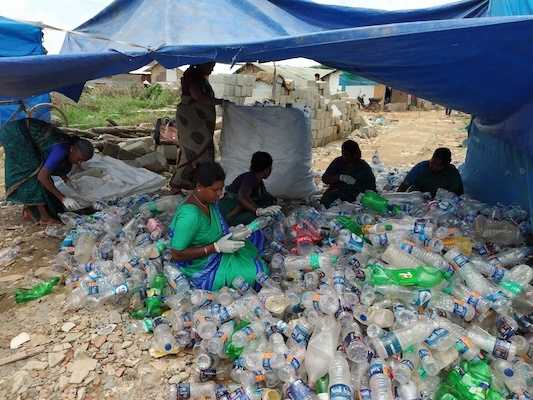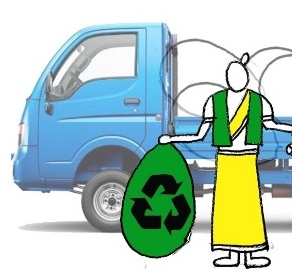The global waste crisis is rapidly growing. With waste generation estimated to increase to 3.4 billion tonnes by 2050, the effectiveness of systems that manage this waste has become vitally important to prevent environmental, health-based and societal issues. While developed nations have adopted centralised systems to manage their waste, developing nations have long been dependent on decentralised waste management systems functioning in an informal waste economy. Integration of the informal sector to the waste sector structure increases waste collection and recycling capacity as well as contributing to poverty reduction and increased quality of life.
1. A culture of Circularity: India is extremely blessed to have a functioning network of informal waste collectors, kabadiwalas and aggregators that work cohesively despite how decentralised their network is. Having tried and tested their methods for decades, the circular economy has been embedded in the culture and the resourcefulness of these players – ensuring the effectiveness of their system.
2. Better quality: While seemingly counter-intuitive, the reality is that the most advanced technological advancements that have been made in waste segregation still can't compare with the ability of trained and skilled workers to segregate waste material. Therefore, the quality of the material making its way through informal supply chains tend to be much higher than waste that is sorted by machines in centralised systems – which often costs millions of dollars.
 3. Investing in small scale entrepreneurs: The sector is deeply entrepreneurial and decentralized. The waste pickers often recruit from the ranks of migrants and urban poor, the emphasis of any policy should be on inclusion — improving the safety, health, efficiency and wages of the waste pickers while working to integrate the value of their collection into a more holistic waste management system. The performance of waste pickers could be greatly improved with capability building, access to capital and basic tools, a reliable and source-segregated waste stream, and cooperation from municipalities. Any proposed integrated waste system strategy should be designed with meaningful consultation with waste pickers and the nonprofit institutions that support them to ensure their interests are protected and the project implementation is holistic.
3. Investing in small scale entrepreneurs: The sector is deeply entrepreneurial and decentralized. The waste pickers often recruit from the ranks of migrants and urban poor, the emphasis of any policy should be on inclusion — improving the safety, health, efficiency and wages of the waste pickers while working to integrate the value of their collection into a more holistic waste management system. The performance of waste pickers could be greatly improved with capability building, access to capital and basic tools, a reliable and source-segregated waste stream, and cooperation from municipalities. Any proposed integrated waste system strategy should be designed with meaningful consultation with waste pickers and the nonprofit institutions that support them to ensure their interests are protected and the project implementation is holistic.
4. More efficient: These informal systems have proven to be far more efficient than their formal systems at resource recovery – boosting certain advantages in specific urban areas such as slums, where they have far more experience.
5. Fewer transportation costs: Decentralised systems see waste sorted and graded at a community level instead of being transported many kilometres to a centralised hub. This results in transportation costs being reduced considerably – making it far more cost effective.
6. Fewer landfills: Many large centralized waste management contractors tend to run successful business models by sending the waste they collect straight to landfills – earning them a tipping fee. This often happens to be more profitable than having to cover the cost of collection, transport, segregation and aggregation but at the same time, results in less material entering the circular economy and contributes to the growing pollution crisis. Informal waste systems inherently do not have this issue.
7. Less corruption: The waste management system has gained a global reputation for fostering corruption with the rights to large waste management contracts being used for political leverage. Decentralized systems help create resilience against such monopolistic and corrupt practices.
8. Social change: At Plastics For Change, we believe that waste can be used as a resource to create positive change. By supporting and empowering these decentralised systems, emerging economies can do just that – by helping build the livelihoods of the players in these economies, many of whom have been socially marginalised.
The fact that centralized waste management contracts tend to exclude individuals from these communities, due to barriers such as illiteracy, make it even more important to ensure that their livelihoods are protected. Apart from these salient reasons, there is also the simple fact that these informal economies have been the backbone of the waste management in emerging economies for generations – and abandoning them now would be reprehensible.
Having listed its benefits, it must also be acknowledged that these informal waste economies are far from perfect and have a number of important issues that need addressing. Instead of casting it aside for its problems, the benefits listed above prove that it would be far better for emerging economies to invest in these informal systems and develop their capabilities.
Therefore, legislation like emerging EPR laws should embrace these decentralised systems by facilitating investment into the development of its infrastructure. Such an act would go a long way in helping create a more sustainable and inclusive waste management system that is capable and effective in dealing with the global waste crisis.



























